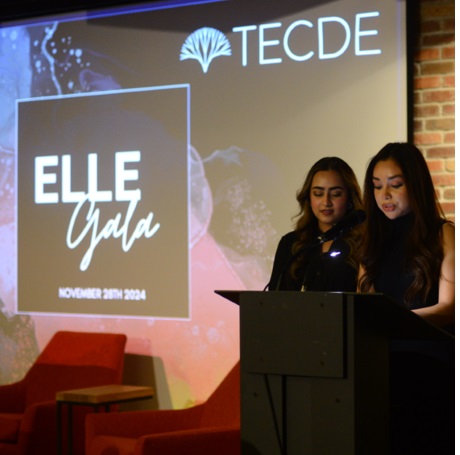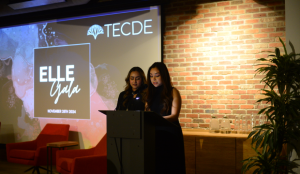LANGUAGE

Vuk Cvetanovic • 7 Feb, 2025
On February 15, following the performance of Controlled Damage at Ottawa’s National Arts Centre, audience members will be dazzled, as they are pulled back in time to experience the glitz and glamour of the roaring 20s and the Harlem Renaissance with Renaissance: Official Black Out Night After Party, curated by Hors Pair Social, the latest edition of Black Out Night at the NAC.
Controlled Damage, by playwright Andrea Scott, whose previous work includes award-winning plays Better Angels: a Parable and Don’t Talk to Me Like I’m Your Wife, tells the tale of Viola Desmond, a trailblazing figure in the fight for civil rights in Canada. After the performance on February 15, show attendees will be invited to Renaissance: Official Black Out Night After Party. Taking place in the NAC’s Canada Room, overlooking the scenic cityscape of the national capital, attendees will be able to dance the night away in feathers, pearls, fringes, and all the finery of yesteryear. Period-appropriate dress is encouraged!
With all-star musical performances by the Lionyls, Miss Mcleod, and sounds provided by Music by Jayel, this event, which is open to audiences to all attendees of the February 15th performance of Controlled Damage, though the event is catered to those above the age of 18. The afterparty, in conjunction with the prior play, will offer Black audiences, as well as their guests, a unique opportunity to enjoy the vibrant musical performances that the Black community has to offer. As always, everyone is welcome to join Black Out Night, fostering a spirit of inclusivity and celebration.
For tickets for Controlled Damage Black Out Night, visit: https://arts.nac-cna.ca/en/syos/performance/9462
Black Out Night – A Harlem Renaissance-themed celebration at the NAC
Feb 7, 2025 • Vuk Cvetanovic

Lourdes Myah Anglade • Jan 22, 2025

(Photo by Parujee Akarasewi)
This week, CHUO had the unique opportunity to experience a breathtaking fusion of music and film as Howard Shore’s Academy Award winning score was performed live alongside the epic motion picture, The Lord of the Rings: The Fellowship of the Ring, in high definition.
The immersive performance featured 250 musicians from the renowned FILMharmonique Orchestra and Choir, creating an unforgettable atmosphere that transported the audience deep into the heart of Middle-earth. As the majestic story of the Fellowship’s quest unfolded on the screen, the live orchestra and choir brought every scene to life with unparalleled vibrancy, offering a once-in-a-lifetime experience for all attendees.
The concert was a seamless blend of cinematic storytelling and musical excellence, showcasing the talent and dedication of the performers. From the haunting melodies of the Shire to the thunderous rhythms accompanying battles and pivotal moments, each note enhanced the emotional gravity of the story.
For fans of J.R.R. Tolkien’s legendary saga and Howard Shore’s iconic compositions, this event was nothing short of magical. Some general Information About the Concert:
- Producer / Presenter: GFN Productions & FILMharmonique Orchestra
- Performed by: The FILMharmonique Orchestra
- Choir: Choeur des Mélomanes and Les Petits Chanteurs du Mont-Royal
- Conductor (Ottawa): Shih-Hung Young
- Soloist: Kaitlyn Lusk
- Location: The Arena at TD Place
This stunning event emphasized the collaborative power of music and film, uniting seasoned performers with the timeless narrative of Middle-earth. With Kaitlyn Lusk as the featured soloist, her voice added a layer of emotional depth, resonating with the audience in key moments.
The meticulous direction of conductor Shih-Hung Young ensured a flawless synchronization between the music and the visual storytelling.
For those in attendance, the live concert was more than just a performance; it was an immersive journey into one of the greatest cinematic and literary adventures ever created. The meticulous craftsmanship and the enduring legacy of The Lord of the Rings were celebrated in grand style, leaving attendees with memories that will undoubtedly last a lifetime.
The Lord of the Rings, the characters, names, and places therein, are trademarks of (TM) The Saul Zaentz Co., d/b/a Tolkien Enterprises, under license to New Line Productions, Inc. All rights reserved.
The event’s website can be found here.
Lord Of The Rings: The Fellowship Of The Ring in concert
Jan 22, 2025 • Lourdes Myah Anglade

Hervé Mugisha • 31 Dec, 2024
Living in Canada for several years now, Bradley and Alvin remember their home country Burundi with a touch of nostalgia even though they were victims of homophobic oppression there. Despite protective laws in Canada, they warn LGBTQIA+ newcomers from Burundi to remain cautious.
I am waiting for Bradley in a small cafeteria in downtown Ottawa. He arrives in a black polo shirt, blue jeans, and a little earring in his left ear. The shy, often defensive 31-year-old I remember in Bujumbura is now full of life.
Bradley’s life as a gay man began thousands of kilometers from here in Burundi, a small East African country ravaged by decades of civil war where authorities use homophobia as a propaganda tool. Bradley was a quiet boy in a wealthy family who discovered his sexual orientation early on.
“From a young age, I felt different from other little boys. At school, I liked to play only with girls. Other boys called me ‘queer’, a homophobic term [in the Burundian context] I knew nothing about.”
Bradley’s mother, who he describes as open-minded, understood that her son loved “girl stuff” and started buying him women’s clothes.
“I liked to wear the igitenge (a traditional skirt of multi-coloured fabric). I saw the women around me wearing this outfit and I imitated their actions once she put it on me”, Bradely remembers with a smile.
In June 2018, then 24, Bradley came to Ottawa to attend a conference for young community leaders and decided to stay in Canada after applying for asylum.
“It was like a dream come true for me. I was finally able to be myself and live my homosexuality in a more fulfilling way. In Ottawa, I was reborn from my ashes. Another me, full of hope, resurfaced, full of ambitions.”
Finding strength in unity, Bradley joined several LGBTQIA+ community groups in the Ottawa-Gatineau locality. There he found a new family that welcomed him with open arms and provided support, advice, and career guidance.

(Kushal_sarkar\Pixabay)
When homophobia leads to isolation
Back in Burundi, despite his mother’s support and affection, Bradley’s sexual orientation and more feminine gender expression always upset his older brothers. “They constantly heckled me and told anyone who wanted to hear that they didn’t understand how a boy could behave like this! ‘You’re embarrassing us,’ they shouted. Our society is very macho and men who are a little bit effeminate like me are often mistreated and rejected by other men”, he said.
As a child, Bradley isolated himself to escape the laughter and ridicule of his siblings. “I used to lock myself in my room to listen to music and watch movies. My room became my refuge to decompress in the face of homophobia. I had almost no social life.”
Because of the hostile climate at home, Bradley sometimes stayed with his aunt in Ngozi, a province more than 100 km northeast of Bujumbura.
“I never missed the opportunity to go to her place and spend long weeks there, especially during the summer holidays. I was enjoying the fresh air of the countryside, but it was mainly to escape my brothers who tormented me. My mom was sometimes not there to defend me.”

Despite being protected by the law, some members of the LGBTQIA+ community struggle to live their lives. (Saeid Anvar\Pexels)
To taste the delights of life
Soon after arriving in Ottawa, Bradley met *Tim. “Unlike my previous affairs in Bujumbura, with Tim [who is Canadian] I could live my homosexuality openly, such as holding hands in public, without fear of suspicious looks or physical aggression … a way of life that was forbidden to me in Burundi.”
However, after a few years in Canada, Bradley realized that homophobia was not completely behind him, even in a country where LGBTQIA+ people’s equal rights are guaranteed by law. “This [homophobia] comes from roommates, often people from countries where homosexuality is a crime, in front of which you can’t openly show yourself with your lover when he arrives at your house, despising looks from colleagues, superiors not always accommodating to homosexuality, etc.”
Bradley found a job at an adult disability home in Hawkesbury, a small conservative town in eastern Ontario, just two months after he arrived in Canada. “To clear my head and spend some nice naughty moments without being disturbed, I visit Montreal and settle down for a weekend in the Village (a queer-friendly neighbourhood)”.
“Protect yourself in a country where our rights are protected”
Bradley has been living in the country of maple trees for six years now. In this time, he has made a mental map of ‘safe’ and ‘not safe’ places in relation to his sexual orientation. “Contrary to what many people think, even here in Canada, the danger remains in some places. I know very well, for example, where I can live my homosexuality without fear of aggression and where it is not safe at all to do so.”
He said caution is still required when you are gay and living in Canada in 2024. He sums it up in a simple phrase. “Protect yourself in a country where our rights are protected”.
Bradley is critical of some of his fellow LGBTQIA+ Burundians who arrive in Canada and pursue a life of unbridled freedom. “I understand very well that years lived in a restrictive context leads to wanting to ‘let go’ once in a more permissive framework. But that is no excuse for young people from Burundi to come here and get addicted to drugs, alcohol, sex, excessive social life and miss the opportunities to build their own lives that Canada offers for gay exiles.”
In Hawkesbury, Bradley said he has found an excellent setting to fulfil his dream of being himself while being useful to others. “When you are gay, you often grow up with the idea that you have no value in the eyes of others. Here I have realized my dream to prove myself and prove to others that my homosexuality does not prevent me from taking care of my neighbour.”
Two lives, the same destiny
Alvin discovered his sexual orientation at 17 in secondary school after a string of unfulfilling relationships with girls. “It was as if I were drinking a tasteless drink,” he remembers. A native of Bujumbura, Alvin moved to Kampala for his studies and fell in love with a handball teammate. For three years they remained lovers. News of their relationship spread to one of Alvin’s former girlfriends, who told so many people in Bujumbura that he dreaded visiting for the holidays. Upon returning home, his father, a former army officer, demanded Alvin tell him the truth. “I categorically denied it. I had no other choice, seeing as he could cut me off or disinherit me.” Stigmatized and shamed, his studies became his only respite.
In April 2015, when Alvin was in his final year of school, a political crisis erupted in Burundi. With the massacres that followed, his parents feared for their son’s life. “Seeing the security situation deteriorating, they began procedures for me to continue my studies in the United States.” After several unsuccessful attempts, Alvin arrived in the U.S. in July 2017. It felt like “total liberation, because I could finally be able to make a decision without depending on my parents,” he remembers.
Three months later he visited Montreal and discovered a whole different world where people from the LGBTQIA+ community appeared relaxed in the street. The only problem for him there were fellow Burundians. “It’s like you’re being spied on, stalked in the morning,” he says. To avoid disappointing his parents back home, Alvin assumes a “camouflage strategy” and keeps his sexuality private in public.
Now settled in Montreal and living in a common-law relationship with a Salvadoran man. Although they don’t often bring up the subject of marriage, Alvin’s parents remain hopeful that one day he will get married with a lady. “When such discussions arise, I send them money to calm the situation,” an annoying ritual Alvin has come to consider a bribe. As for his love life, he has to be careful.

In the life of a marginalized minority, dark thoughts find themselves frequently crossing their minds. (Mstudio\Pexels)
Like Bradley, Alvin has little patience for LGBTQIA+ Burundians who, instead of pursuing their dreams, “indulge in debauchery”. “If it were up to me, I would tell the associations that help them to cut off financial support. We must take care of our image, be role models, and pursue our dreams. Otherwise we will always be the laughingstock of Burundi, and it will be difficult for us to advance our cause.
No hope for his home country
With regard to his family back in Burundi, Bradley said he has reconciled with the brothers who once abused him. “As I send money to my family from my comfortably paid work here, my brothers no longer dare to make disparaging remarks about my sexual orientation as they used to do in the past.”
Bradley pays his highest praise and gratitude to his mother. “She was always by my side in a society where I felt that I did not belong as a gay man,” he said, almost moved to tears. “When I felt like giving up, she encouraged me to keep going. I almost quit school, but she pushed me to continue my studies, and since I’m here, she has been urging me to be happy.”
As for his home country where homosexuality has been criminalized since 2009 and sexual minorities are constantly abused in official speeches, Bradley says he has no hope of improvement. “When the head of state calls for the stoning of gay men in a stadium (1), this [harms] the gay community already heavily stigmatized within society. All this makes me sad and pessimistic”.
PS: Names have been changed to protect sources’ identities.
(1) On 30 December 2023, the Burundian president, Evariste Ndayishimiye, in a public broadcast live on State Radio and Television called for “the stoning of gay people in a stadium”.
The struggle of being yourself – The two lives of Burundian members of the LGBTQIA+ community
Dec 31, 2024 • Hervé Mugisha

Hadassa Igirubuntu • 14 Dec, 2024
 (Deux animatrices faisant parties du comité TECDE lors du Elle Gala 2025 photo par Hadassa Igirubuntu/ CHUO)
(Deux animatrices faisant parties du comité TECDE lors du Elle Gala 2025 photo par Hadassa Igirubuntu/ CHUO)
C’est lors d’un jeudi soir 28 novembre 2024, dans l’un des bâtiments de la rue Elgin, qu’a eu lieu le Elle Gala, un événement organisé par le TECDE, un club étudiant d’entrepreneurs de l’université d’Ottawa. Cet événement mets en lumière le genre féminin dans le monde de l’entreprenariat, offrant aux participantes l’opportunité de rencontrer des mentors inspirants et de faire des connexions précieuses.
À chaque année, le genre feminin dans le monde de l’entreprenariat est mis de l’avant par un groupe d’étudiants de l’université d’Ottawa. Celui-ci forment un club du nom de TECDE, un club d’entrepreneur, composé d’élèves actifs de l’université d’Ottawa menant leurs études dans l’une de leur faculté sans nécessairement avoir un lien avec l’entrepreneuriat. Le Elle Gala, dont c’est la 27e année qu’elle a lieu, est une événement anglophone qui invite les jeunes à prendre un temps pour s’asseoir et écouter des femmes inspirante de la région axée dans le domaine du business mais aussi pour se faire des connexions à travers le networking sans oublier bien entendu d’avoir du plaisir tout en s’instruisant! Des petits collations étaient servis ainsi que des boissons afin de rendre la soirée plus agréable pour les invités et le public présents.
Selon une des membres du comité à l’origine de ce Gala « Il est important d’avoir des mentors extraordinaires, des femmes mentors à qui je peux demander conseil. » s’exprime Diya Sharma suite à l’événement en prenant faveur aux femmes « Je fais tout ce qui est en mon pouvoir pour veiller à ce que les femmes réussissent dans tous les secteurs qu’elles souhaitent. »
Voici la liste des différents invités d’honneur du Elle Gala répartis en 4 catégories.
Women in business Law: Naomie Morisawa De Koven (avocat gérant de MDK Business Law), Leigh-Anne Norris (associé principal de Denton) et Catherine Walsh (avocat général et COO auprès de Nordik Windows and Doors).
Women in sport business: Angella Goran (Fondatrice et CEO de TapanGo Technologies & ATHLETICA Reward) et Hailey Davis (Directrice de média digital et de contenus auprès de OSEG, Ottawa 67’s & REDBLACKS).
Women in tech: Kayla Isabelle (CEO de Startup Canada), Claudia Novaro Fragoso (Ingénieure client à Google Cloud) et Bernadette Sarazin (CEO & CPO pour Etika Privacy).
Women in leads: Victoria Lennox (Fondatrice de Startup Canada), Sarah Sedgman (CEO de LearnExperts), Priya Bhaloo (CEO de TAG HR) et Mariza Fosco (Directrice et Investisseure à Capital Angel Network).
Lors des différentes prises de paroles, les intervenantes ont partagé des messages puissants tels que « Les femmes ne sont pas limités à la table, c’est nous qui la construisons ! », « N’abandonnez pas, essayez toujours » et « Concentrez-vous sur votre objectif de créer une entreprise », inspirant ainsi les jeunes participants à briser les barrières et à suivre leurs passions. En participant à des événements comme le Elle Gala, ces jeunes femmes ne se contentent pas de rêver, elles construisent un avenir entrepreneurial fort, solidaire et prospère.
Le concept du Elle Gala était interactif, basé sur des questions de la part des animatrices et animateurs suivies des réponses des invités d’honneur. Chacun des invités a pris le micro partageant son parcours, ses conseils et ses expériences, créant de cette façon une opportunité unique et précieuse de mentorat pour les jeunes qui y sont présents. Les questions posées par les animateurs servaient de point de départ à des discussions plus larges, abordant des sujets comme l’investissement dans le marché boursier ou l’importance d’investir dans son propre apprentissage dès le plus jeune âge. Ces échanges ont permis aux jeunes de réfléchir à leurs propres ambitions, tout en posant des questions concrètes aux mentors pour obtenir des conseils directs.
Des temps de réflexion étaient également intégrés à l’événement, permettant au public de poser leurs propres questions et d’interagir directement avec les intervenantes. Cela a créé un véritable dialogue, encourageant les jeunes femmes à ne pas avoir peur de lever la voix dans un domaine souvent dominé par les hommes. « Quand tu fais pas partie de la majorité, tu fais partie de la minorité mais, t’as un avantage, tu stand out! Donc, comment utiliser ça? » s’exprime Garrick Apollon, un professeur de l’université d’Ottawa. « Je pense que numéro un, sont les barrières, les limites que les personnes vont se mettre eux-même. Les femmes en générale vont se mettre des barrières elle-même, faut avoir du leadership de surpasser ça, de croire en soi-même, de s’aimer soi-même pour réussir. La deuxième chose, c’est d’aller au-delà des stéréotypes. » ajouta-t-il lors d’une entrevue avec lui après l’événement.
Bien justement, les femmes entrepreneures ont insisté sur l’importance pour les filles de s’exprimer et de ne pas se cacher, surtout dans un monde d’affaires où leur voix est encore parfois étouffée. Elles n’ont pas hésité de remercié les garçons d’être présents pour soutenir le Elle Gala qui pronne la place de la femme dans le monde du business. Tout comme l’invité d’honneur Naomie tient à prouver, il y a encore du chemin à faire pour les femmes « L’association du barreau canadien a publié un rapport en début d’année qui montre qu’il existe toujours une énorme différence d’équité salariale entre les avocates et les avocats. » Toutefois, les mentors soulignent l’importance de travailler ensemble pour briser les barrières et ouvrir la voie à un futur plus égalitaire et équitable pour tous dans ce domaine d’entrepreneur.
Soyez prêt pour le prochain Elle Gala en 2025, où l’entrepreneuriat féminin sera de nouveau mis à l’honneur, avec pour objectif de continuer à bâtir des ponts, tisser des liens et certainement à encourager l’innovation ainsi qu’à inspirer les générations futures.
«J’ai rencontré tant d’étudiants intéressés par le droit des affaires (par exemple) mais qui n’ont pas rencontré les bonnes personnes […] c’est pourquoi le gala Elle est si important. Outre les panels que nous organisons, nous avons des opportunités de travail extraordinaires où les étudiants peuvent parler à des personnes très intéressantes qu’ils n’auraient pas eu l’occasion de rencontrer autrement. » explique Diya Sharma, co-directrice du comité TECDE.
Elle Gala : Une voix forte pour les entrepreneures, un espace (unique) de mentorat
Dec 14, 2024 • Hadassa Igirubuntu
